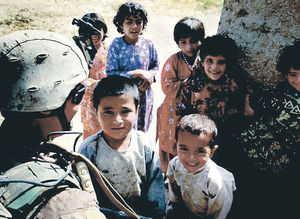Learning Language and Culture is an Important Part of Being a Marine
By Valeria O'Berry
Today, Marines must be proficient in foreign language and cultures around the world in order to be prepared for vital missions. This training comes from the Center for Advanced Operational Culture Learning (CAOCL) at Marine Corps University.
CAOCL is still very young, having been established in 2006 by retired Marine Gen. James Mattis, then-commander of the Marine Corps Combat Development Command (currently secretary of defense), in order to ensure Marines and Marine units were equipped with sufficient regional, culture and operational language knowledge to operate effectively in complex expeditionary environments. Although Mattis was responding to lessons learned in Iraq and Afghanistan, he was echoing the intent of Maj. Gen. John Legeune, who in 1924 said that officers should be proficient in foreign languages because in all probability, as it has been in the past, the discharge of an officer’s duties would require communication with the inhabitants of a foreign country in their language.
“I don’t think it is an exaggeration to say that, after learning the same lessons about the necessity for language and culture knowledge in conflict after conflict, by establishing and resourcing CAOCL, the Marine Corps has finally made good on General Lejeune’s intent,” said George Dallas, CAOCL director for MCU.
The primary education is the Regional, Culture and Language Familiarization (RCLF) program, which is taught online in blocks targeting Marines from sergeant to lieutenant colonel, who start the program assigned to one of 17 different regions. In addition, CAOCL professor of cross-cultural competence and regional subject matter experts also support instruction at MCU Professional Military Education courses. In addition, training at units that are in pre-deployment mode receive training at their location.
“I think most Marines would be shocked to find out how much expertise we have in our small outfit, which ranges from experienced foreign area officers and SNCO’s to highly educated civilians from all over the world,” Dallas said. CAOCL is also involved in functions related to social science research.
“I think it is most important for Marines to understand that the Marine Corps is truly committing to the idea that LREC (Language, Regional Expertise and Culture) is essential to expeditionary operations and that consequently, the opportunities and rewards for learning a foreign language and cultures will only increase,” Dallas said.
The focus Marines have on LREC can also be exciting to family members because language is best learned collaboratively and families can join in their Marines’ training by using free, open source technology such as the popular and free Duo Lingo language learning smart phone app.
“Additionally, Marine families that speak a language other than English at home should increasingly know that this diversity is contributing to the ability of the Marine Corps to accomplish its mission,” Dallas said.
In the future, CAOCL wants its RCLF program to grow and its training content to meet the evolving needs of the operating forces. To do that, Dallas said that the program is going to leverage distributed learning technology as much as possible to get the information in the hands of Marines outside of the classrooms and even downrange.
“We have a functional pilot app that would allow Marines to access updated regional information created by our instructors,” he said.
Visit www.usmcu.edu/app for more information.
